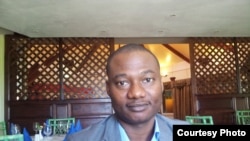An initiative meant to reduce dangerous smoke and gases from homes is said to be putting cash in the hands of women traders in Nigeria and Ghana.
The development of clean energy or biofuel gel for cooking is also contributing to efforts to diminish climate change in West Africa. The project was pioneered by Green Energy and Biofuels of Nigeria.
The executive director, Femi Oye, said they converted waste from saw dust and water hyacinths into clean–burning fuels designed specifically for cooking stoves.
“In Africa, we have huge waste. Dump sites of saw dust burn and produce pollutants to the environment. We accelerated our technology and converted this to clean energy. When you use this to cook, it is safe and clean”.
The project began as an effort to reduce the amount of money some women spend on kerosene to generate lighting for households and small business ventures. Oye said Green Energy and Biofuels offer solar electrification for a whole community.
“From there, the project went to another level and we started asking, ‘How else can [the women] stop using kerosene permanently to cook? So, from there [we started thinking about] providing alternatives for women to cook without using firewood, charcoal or kerosene. That is when we discovered we can also get solution to replace that with our biofuel gel.”
About 200,000 households in Nigeria and Ghana are using the cook stove and there are plans to expand distribution throughout the West Africa sub region.
Oye said his outfit is motivated by social and environmental benefits more than monetary gains but his organization is able to cover costs and sustain its operations.
“We use a social marketing model and engage women. [These are] people who really understand how indoor air pollution kills some hundred thousand women every year in Nigeria [so]they get passionate about it. They have extended the network to Ghana, Cameroon and Togo but predominantly, we operate in Lagos”.
Oye is hopeful other states in West Africa will tap into this technology as a way of meeting the energy needs of the region.
“We can join the private sector to actually move this forward because that is the future to solve our energy crisis. And of course when you solve our energy crisis you are immediately taking poverty out of Africa”.
The development of clean energy or biofuel gel for cooking is also contributing to efforts to diminish climate change in West Africa. The project was pioneered by Green Energy and Biofuels of Nigeria.
The executive director, Femi Oye, said they converted waste from saw dust and water hyacinths into clean–burning fuels designed specifically for cooking stoves.
“In Africa, we have huge waste. Dump sites of saw dust burn and produce pollutants to the environment. We accelerated our technology and converted this to clean energy. When you use this to cook, it is safe and clean”.
The project began as an effort to reduce the amount of money some women spend on kerosene to generate lighting for households and small business ventures. Oye said Green Energy and Biofuels offer solar electrification for a whole community.
“From there, the project went to another level and we started asking, ‘How else can [the women] stop using kerosene permanently to cook? So, from there [we started thinking about] providing alternatives for women to cook without using firewood, charcoal or kerosene. That is when we discovered we can also get solution to replace that with our biofuel gel.”
About 200,000 households in Nigeria and Ghana are using the cook stove and there are plans to expand distribution throughout the West Africa sub region.
Oye said his outfit is motivated by social and environmental benefits more than monetary gains but his organization is able to cover costs and sustain its operations.
“We use a social marketing model and engage women. [These are] people who really understand how indoor air pollution kills some hundred thousand women every year in Nigeria [so]they get passionate about it. They have extended the network to Ghana, Cameroon and Togo but predominantly, we operate in Lagos”.
Oye is hopeful other states in West Africa will tap into this technology as a way of meeting the energy needs of the region.
“We can join the private sector to actually move this forward because that is the future to solve our energy crisis. And of course when you solve our energy crisis you are immediately taking poverty out of Africa”.






